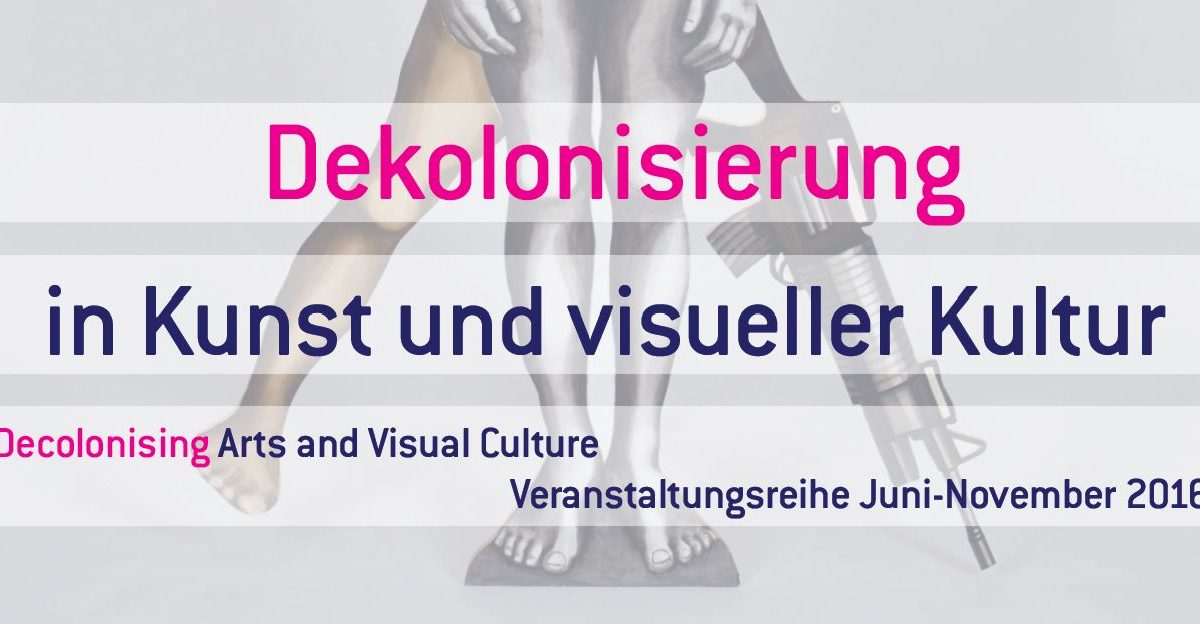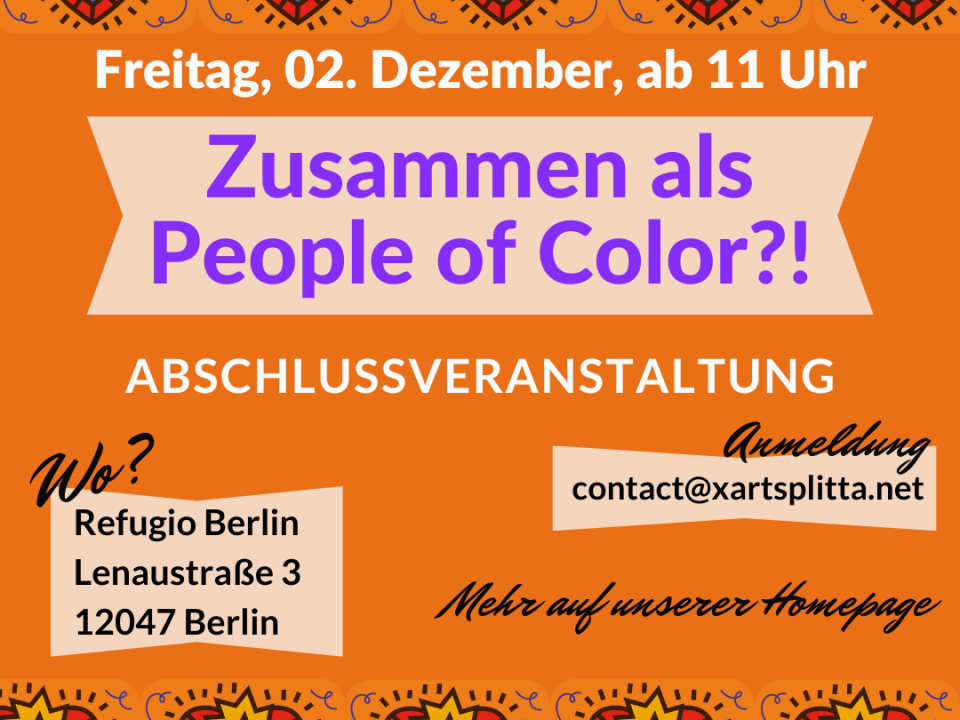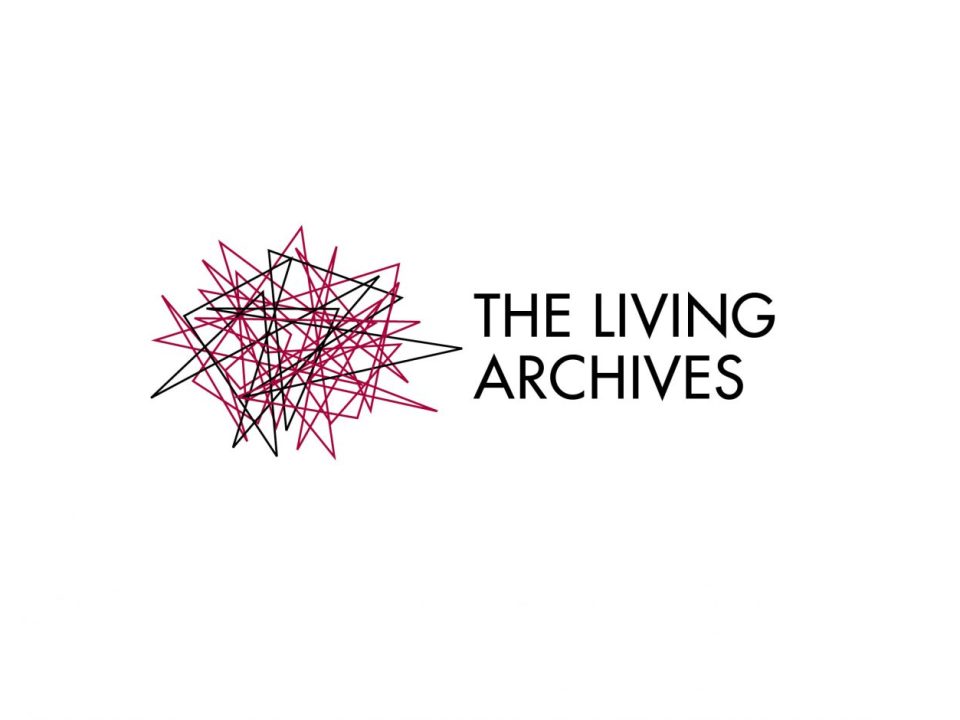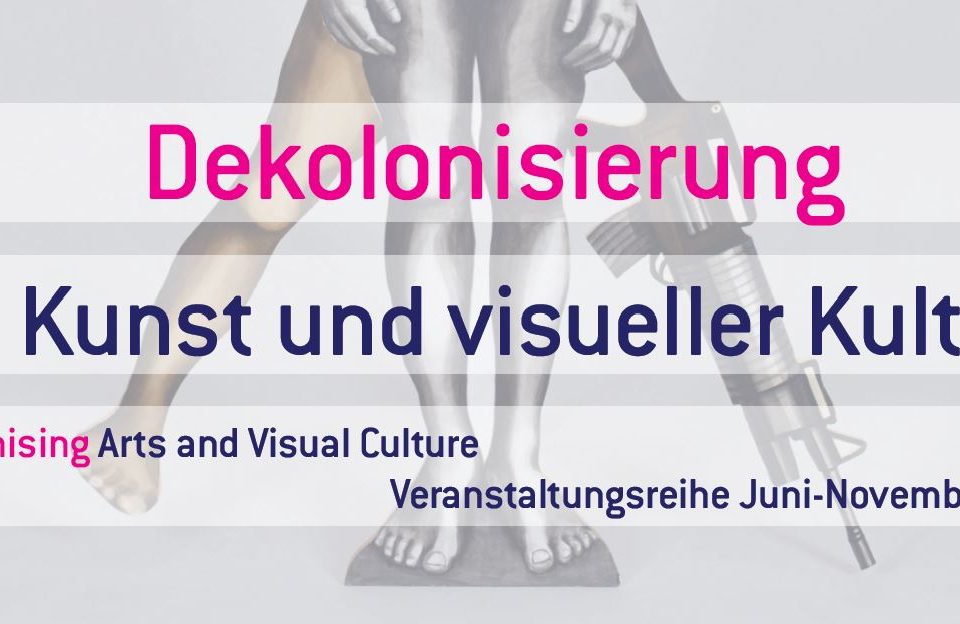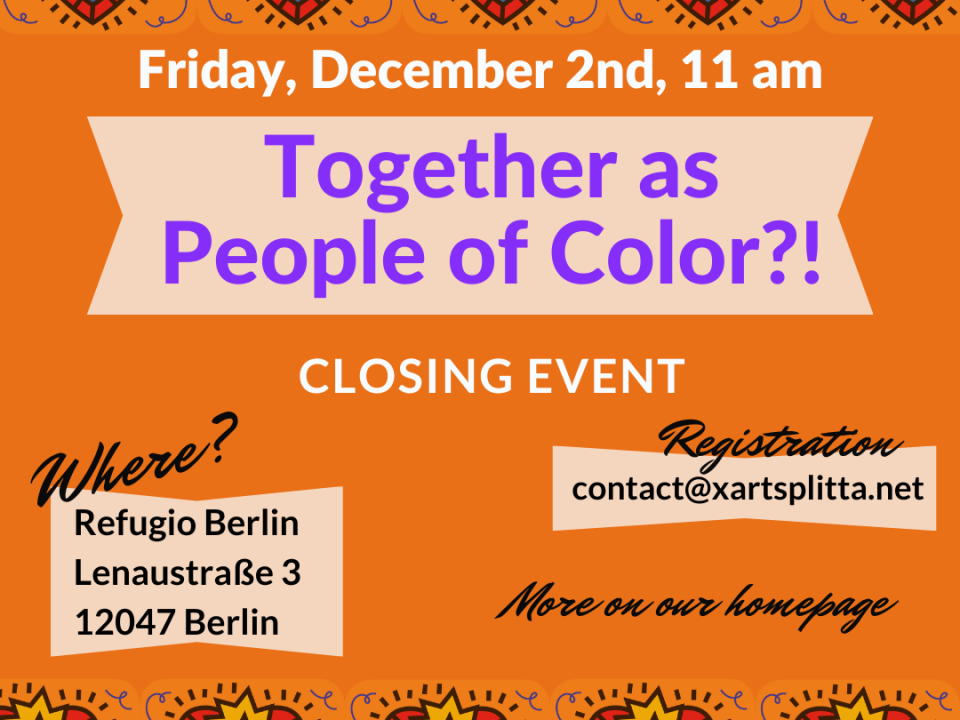
Decolonising Arts and Visual Culture
17.03.2016
w_ort splitta – BuchGespräche zu diskriminierungskritischen Praxen
16.03.2016Was genau heißt Dekolonisierung in Kunst? Wie kann Kunst als Medium wahrgenommen werden, durch das Dekolonisierungsprozesse initiiert werden? Dies ist sowohl für Produzen_tinnen als auch Rezipien_tinnen von Kunst wichtig, die so zu neuen Perspektiven angeregt werden könnten.
Welche Rolle spielen eigene künstlerische und kulturelle Interventionen für Schwarze Kunstschaffende und Kunstschaffende of Colour in der Analyse von Erinnerungskulturen in Deutschland und Europa – vor allem in der Bewältigung und Überwindung der damit verbundenen Traumata? Welche Bedeutungen haben künstlerische Interventionen heute für gesellschaftliche Selbstverständnisse und politischen Aktivismus? Das Bestehen kolonialer Kontinuitäten ist heute wieder einmal sehr deutlich und erinnert (uns) daran, wie wichtig jegliche Formen des antikolonialen und rassismuskritischen Widerstandes sind.
Diesen Fragen möchten wir in dieser Reihe nachgehen. Anhand von unterschiedlichen Veranstaltungen nähern wir uns diesen Fragen sowohl theoretisch als auch performativ an.

flyer dekolonisierung als pdf-version
Auftaktveranstaltung: 10. Juni, 19 Uhr: Ausstellungseröffnung „Blowback“
von Rajkamal Kahlon. Mit Vortrag und Artist-Talk von und mit Sandrine Micossé-Aikins. Rajkamal Kahlons Arbeit Online
In Kooperation mit dem OKK – Organ Kritischer Kunst – organ of critical art. Veranstaltung findet im OKK statt: okk/raum29, Prinzenallee 29, 13359 Berlin-Wedding. www.kritische-kunst.org (Mit Rampe Rollstuhlgerecht)
PM_Rajkamal_Kahlon_Blowback (engl.)
In jüngeren Jahren wurden deutsche kulturelle Institutionen, vor allem Theater, stark für ihre Verwendung von rassistischen künstlerischer Mittel kritisiert. Meist wurden diese kritische Interventionen als übermäßig „aggressiv“, „gewaltvoll“ und nicht selten sogar als „Zensur“ abgestempelt. Die Gewalt die in rassistischer Symbolik und rassistischen Erzählungen inhärent ist wird selten als solche erkannt. Die Rolle diese als Trigger oder zumindest Legitimation für tatsächliche physische Gewalt gegen rassifizierter Körper wird zum großen Teil übersehen. Anhand von Rajkamal Kahlons Ausstellung „Blowback“, wird Sandrine Micossé Aikins über Potenzial, Möglichkeiten, Herausforderungen und Grenzen von kultureller Arbeit als Instrument (dekolonialen) Widerstandes sprechen.
Veranstaltung auf Facebook hier
und
hier: www.facebook.com/events/609954492501203/
Ausstellungsdauer: 10. Juni – 10. Juli. Öffnungszeiten OKK: Do.-So. 15-19 Uhr
16. Juni, 19 Uhr: Vortrag und Performance: Sichtbarmachung der Wissensarchive von Schwarzen Menschen und People of Colour
Vortrag von Rena Onat mit Performance von Serfiraz Vural.
Rena Onat nimmt in ihrem Vortrag ein Bild der Künstlerin of Colour Sunanda Mesquita als Ausgangspunkt, um darüber zu sprechen, wie – mittels Kunst – Schwarze/PoC (queer-) feministische Perspektiven und Wissensarchive sichtbar gemacht werden. Oder besser: Wie (queere) feministische Schwarze Künstler_innen und Künstler_innen of Color Kunst für Prozesse von Queering und Dekolonialisierung in einer Weise nutzen, die nicht nur Widerstand gegen Rassismus und Heteronormativität leistet, sondern zugleich utopische Potentiale im Sinne von José Esteban Munoz‘ Begriffen von Utopie und Queer Futurity beinhaltet. Das Sichtbarmachen von Wissensarchiven beziehungsweise das Erheben eines Anspruchs auf Urheberschaft/Autorschaft eines Wissens, welches von Schwarzen und People of Color, ausgehend von Reflexionen über Rassismuserfahrungen und weiße Vorherrschaft, geschaffen wurde, ist eines der zentralen Themen von Sunanda Mesquitas Bild „Silenced by Academia“. Die Arbeit verweist jedoch darüber hinaus auf die Möglichkeit einer radikalen utopischen (queer)feministischen Schwarzen/PoC Kollektivität/Community und Solidarität.“
Die Performance „Körper im Widerstand“ erforscht wie über Sound, Gesang und Tanz im Alltag kurdischer Communities Kollektivität und Widerstand gelebt wird. Welche Geschichten erzählen uns Sounds, die wir oft beiläufig in Gesprächen einsetzten. Woher kommt die Kraft in kurdischen Klageliedern? Sind kurdische Tänze auch Tänze des Widerstandes? Die Performance ist ein Versuch, kurdische nonverbale Widerstands-Geschichten zu erforschen und in diesem Zusammenhang verschiedene Formen der Tradierung widerständigen Wissens zu beleuchten.
24. Juni, 18h: Offenes Atelier mit Rajkamal Kahlon
Im Rahmen von Kolonie Wedding www.koloniewedding.de/
26. Juni, 19h: Artist-Talk mit und von Rajkamal Kahlon
(Eng.), Ort: OKK – Organ kritische Kunst. Im Rahmen von Kolonie Wedding www.koloniewedding.de/
22. September, 18h: In the Breaks – Decolonising Popular Music
Soundinstallation und Input von Janine Jembere und Sky Deep. Anschließend Artist Talk. (Eng.)
Im Dialog, durch Platten von Heldinnen, ein-Hit-Music-Wundern und Musikgeschäft-Saboteur_innen werden wir die klanglichen Aspekte von Widerstand, Verweigerung und Revolten einschalten.
Der Abend wird unterschiedliche akustische Strategien in einer Geschichte von (meist) North Atlantic Musik verfolgen.
Wir feiern Songs, die auf Empowerment, kollektive Analysen, Gebrochenheit und Mobilisierung abzielen. In the Breaks ist der Raum und Zeit, wo Trauer, Wut, Mut und Freude geteilt werden und denen es gewidmet ist.
oder hier: https://www.facebook.com/events/1576049729369775/
06. October, 18h: Decolonising Art and Visual Culture – Reconstructing Homelands Through Writing
Input und Performance mit Sinthujan Varatharaja and Garunya Karunaharamoorthy. Anschließend Publikumsgespräch.
Following the destruction of the Jaffna Library in 1981 as part of a Sri Lankan state-led strategy of war and genocide against Eelam Tamil people, much of Eelam Tamil literary production has been concerned with the violence inflicted upon Tamil bodies and its tragic aftermaths. Today, more than a third of Eelam Tamils have been displaced from their homeland and live in exile across Asia, Europe, North America and Australia. This includes renowned writers and other critical artists who sought refuge in unfamiliar landscapes. Exile has, however, also given birth to a new generation of writers and narrative styles that have shaken up the Tamil literature world. What does exile then mean for Eelam Tamil people and their rich literary body?
In this session, Garunya Karunahamoorthy and Sinthujan Varatharajah interrogate how statelessness affects the contemporary literary existence of Eelam Tamils as a displaced people and what challenges exile produces for storytelling.
*The event will be held in English*
20. October, 18h: Artificial Irruptions: A typographical Journey of the Heart Emancipated Herself from the Brain
Live Video-Performance von Rima Najdi & Zara Zandieh (Eng.)
A typographical journey of the heart emancipated herself from the brain.
The heart says:
“You pretend to know. You pretend that the brain makes your daily decisions. Rationality is not only considered “civilized” but also a Eurocentric way of putting everything in relation to one another and shaping constellations within this planet. Shaping how your positioning and perspectives, your values and morals, your belief systems and identities are related to everything.
Do you believe you know? Are you more in control when you trust your rational decisions and thoughts?”
She whispers: “I will show you a secret you already know.”
03. November, 18h: Resisting Invisibilities: Performing (De)Colonialities
Performance mit Nathalie Anguezomo Mba Bikoro (Eng.)
“Risk is essential in the concept & practice of democracy because it defines the moment when one chooses to make images or chooses to live them”
Bikoro uses live art practices and digital photography story-telling to create living and performative archives contesting the nature of our cultures, histories and identity. Her research is a decolonial time-machine reacting to sense-memory and political landscapes to create Human Monuments about spaces and peoples across all cultures to re-invent memorial post colonial gestures towards freedom. These narratives are based on true stories and meander with visual fictions.
Bikoro is a conceptual artist from the region of Woleu-Ntem in Gabon and is presently based in Berlin. The crossing of creative disciplines reframes her work in various formats within visual cultural discourses, continuously attempting relations with the context and site in which she is operating. She reframes the contextualisation of creative multi-disciplinarity through the process of collaboration with Theatre of the Oppressed (theatre of decolonisation from Brasil), and Squat Monuments, a developing theoretical practice by Bikoro on decolonising histories and literatures in public space as forms of resistance, protest and community archive. Some of her recent collaborators are with Berlin Tempelhof Refugee Centre, ETEO Black Diaspora School, Manière Noire Gallery, Kuringa Theatre (Anastacia Laboratory & Theatre of the Oppressed), Savvy Contemporary, Gallerie Wedding, AfricAvenir, HAU Berlin & District Shöneberg.
She is an Associate Lecturer in Political Visual Cultures, Philosophy & Fine Arts and is curatorial director of Squat Museum centered around visual arts methods of decolonisation across cultures and geographies such as Brazil, Canada, Mexico, China, India & Africa. She also directs curatorial and artistic projects such as Future Monuments, Squat Monuments, and LAB Encounters Laboratory of Live Art in Senegal.
Her current visual curatorial projects include Future Monuments, Meeting U.F.O’s Performance & Film, Squat Museum (Latin America & West Africa), Live Art Biennale Encounters Senegal, Anastacia Laboratory for African Women and Squat Monuments at District Berlin where she is currently on an artist residency research producing her first sci-fi feature film on decolonial histories on Berlin Tempelhof.
# www.nbikoro.com # www.futuremonuments.com # www.labencounters.com #
Abschlussveranstaltung: 18. November, 18h: Visibility or Opacity: how can one create art that fails to denounce the inhumanity of the bourgeois ideology?
Installation/Performance von RajuRage:
Join Raju Rage for a performative presentation and interactive conversation about legacy, unarchiving, femininity, queerness and the politics of art.
Raju Rage’s work interrogates the ways in which history and memory, in/visibility and the affect of politics, space, symbolism, stereotypes, ethnic codes, ideology and gazes impact the body, with a focus on race, class and gender.
They work in live art, performance, soundscapes and moving image, focusing on de-con-structive techniques of resistance such as interruption, confusion, disturbance. They primarily use their non-conforming body as a vehicle of assemblage and embodiment.
Abschlusspanel:
Mit Rena Onat, RajuRage, Sunanda Mesquita und Nathalie Anguezomo Mba Bikoro. Moderation: Iris Rajanayagam (Eng.)
In Kooperation mit dem Stadtteilzentrum-Familiengarten/Aile Bahçesi des Kotti e.V., Oranienstraße 34, 10999 Berlin-Kreuzberg. www.kotti-berlin.de (Rollstuhlgerecht)
Impulsworkshops:
07. Juli, 17h: Noah Sow: „Außer Kontrolle“: Künstlerinnenvorstellung – Impulse und Austausch
Die Veranstaltung richtet sich explizit an Schwarze Menschen und People of Colour
Noah Sow kennen die meisten als Autorin. Ihre Arbeiten im Feld der Bildenden Kunst sind allerdings ebenso beachtlich. Multimediale Installationen, Kurzfilme, Audiokunst, digitale Konzeptkunst und Performance sind nur einige der Mittel ihrer Wahl. An diesem Tag stellt Noah Sow einige Arbeiten vor. Noah Sows künstlerische Philosophie ist, in Layern zu produzieren, damit Menschen aus den Diasporas sich ihre Verbindungs- und Interessensebenen selbst aussuchen können. Ihre Werke beschäftigen sich mit Dekolonisierung, Pop, Selbstermächtigung, Resilienz, Blickumkehr, Schwarzen Kulturen und Medien. Anschließend ist Gelegenheit zu Fragen und zum Austausch.
Ein Vorgeschmack ist zu begutachten auf http://www.noahsow.de/artist/
Im Anschluss zur Präsentation findet eine Austauschrunde mit Noah Sow für Schwarze Kunstschaffende und Kunstschaffende of Color statt. Die Präsentation kann ohne Anmeldung besucht werden. Für die Austauschrunde im Anschluss bitte unbedingt mit 1-2 Sätzen zu eurem künstlerischen Gebiet und /oder derzeitigen künstlerischen Fragestellung unter: contact@www.xartsplitta.net anmelden.
Die Veranstaltung findet auf deutsch statt und ist kostenlos. Anmeldeschluss: 30.06.2016
Bei Bedarf können wir engl. Flüsterübersetzung anbieten. Hierfür bitte auch unter contact@www.xartsplitta.net melden.
17. November, 17h: RajuRage: Re-Mapping Art and Creativity
Bitte meldet euch unter: contact@www.xartsplitta.net mit ein paar Sätzen zu eurer Motivation für die Teilnahme an.
Der Workshop findet auf englisch statt und ist kostenlos. Anmeldeschluss: 10. Nov. 2016
A workshop to share and map creative resources that address race/ism in arts curriculum. we will create our own creative visual map and locating our own art histories.
Who are the artists that inspire you?
Who are your favourite artists/creatives/collectives?
Which histories are you/we not taught about?
A creative workshop exploring various decolonial and accountability processes and work. This workshop will creatively explore surviving and thriving in and out of the art school as black and people of colour artists and creatives. Using the ‚Surviving the Art School‘ Publication, produced by Collective Creativity and Nottingham Contemporary, an art collective that Raju Rage is a part of, as well as several other pedagogy resources, as a starting point in order to gain insight into what it visually entails to map our own histories of art. please bring resources to share with the group.
Konzept & Kuration: Iris Rajanayagam rajanayagam@www.xartsplitta.net (Ab Aug. 2016 in Elernzeit)
Koordination ab August 2016: Mai Zeidani Yufanyi zeidani.yufanyi@www.xartsplitta.net
Flyer Artwork: Rajkamal Kahlon (aus der Reihe „Blowback“)
In Kooperation mit:
 OKK – organ of ctritical arts
OKK – organ of ctritical arts  Kotti e.V.
Kotti e.V.
Gefördert von:


Kurzbios der beteiligten Personen
Nathalie Anguezomo Mba Bikoro: Konzeptkünstlerin, die gegenwärtig in Berlin lebt. Bikoro entwickelt einen neuen Rahmen für die Kontextualisierung kreativer Multi-Disziplinarität durch den Prozeß der Zusammenarbeit mit Theatre of the Oppressed (Theater der Unterdrückten) und Squat Monuments (Gedrungene Monumente), eine in der Entwicklung befindliche Praxis von Bikoro über die Dekolonisierung von Geschichte(n) und Literature(n) im öffentlichen Raum als Form des Widerstandes, Protestes und als Gemeinschaftsarchiv. www.nbikoro.com
Sky Deep: Produzent_in, DJ and Performer_in. Sky Deep beschäftigt sich in der Arbeit und Musik insbesondere mit den Themen Black Musik, postkoloniale Theorie im Kontext von Musik und musikalischer Wissensproduktion und war zuletzt involviert in dem bei der CTM präsentierten Projekt „female:pressure“. www.facebook.com/SkyDeepOfficial
Janine Jembere: arbeitet in unterschiedlichen Konstellationen an Performances, Radiosendungen, Interventionen und Filmen. Realisierte zuletzt mit Michael Götting am Ballhaus Naunynstrasse die inklusive Performance „Decolonize Bodies! Minds! Perceptions!“ und gemeinsam mit Yara Spaett das Performance Projekt „Female Gaze“. Sie forscht zurzeit als Doktorandin in Wien zu sinnlichen Hierarchien. www.soundfilm.de/
Rajkamal Kahlon: Künstlerin und Pädagogin. Kahlons Zeichnungen, Bilder und performative Installationen verwenden überlappende Strategien kritischer Ästhetik und absurden Humors, um die pädagogische Funktion von Texten und Bildern zu unterbrechen, die in historischen und zeitgenössischen kolonialen Archiven zu finden sind. Kahlons Arbeit wurden in Berlin u.a. im Haus der Kulturen der Welt, Wilhelm Hack Museum und dem NGBK ausgestellt. www.rajkamalkahlon.com/
Garunya Karunaharamoorthy: studierte Franko-Deutsche und Europastudien in Berlin (FU), Paris (Sciences-Po, Sorbonne-Nouvell) und London (LSE) und erwarb ein Diplom in Tamil (TBV) sowie in Karnatischer Musik (OFAAL). Sie ist ausgebildete Bharatanatyam Tänzerin. Garunya arbeitet als leitende Herausgeberin beim Lexxion Verlag und als Lehrerin bei der Tamilischen Bildungsvereinigung e.V. in Berlin.
Sunanda Mesquita: Künstlerin, Pädagogin und Filmemacherin. Derzeit studiert sie an der Akademie der bildende Künste Wien. Ihr Fokus liegt dabei auf Bildung in Kunst und Video und Videoinstallation. Durch DuBois Konzept von „Double Conciousness“ beeinflusst, beschäftigt sie sich mit Themen zu Citizenship, Zugehörigkeit und Konzepten von „Heimat“. Als Teil ihrer künstlerischen Praxis leitet sie in Schulen und Universitäten Workshops mit einem Fokus auf Empowerment von Studierenden of Colour, die kritische Befragung von epistemischer Gewalt in der Wissensproduktion und die Vermittlung von Geschichte. Seit 201 ist sie stellvertretende Vorsitzende des Equal Opportunities-Teams an der Akademie der bildende Künste Wien.
Sandrine Micossé-Aikins: Kunstwissenschaftlerin und Kuratorin. Sie arbeitet inhaltlich schwerpunktmäßig zu Rassismus und Empowerment in der Kunst, der Wirkmacht kolonialer Bilder, Körperpolitik sowie Repräsentation und Teilhabe im deutschsprachigen Kunst- und Kulturbetrieb. Seit Mai 2016 Geschäftsleitung Berliner Projektfonds kulturelle Bildung.
Rima Najdi: performance Künstlerin zur Zeit in Berlin ansässig. rima Najdi arbeitet in verschiedenen Disziplinen u.a. Performance,Video, Installation und Design. Sie hat ein Diplom in Darstellende Künste (2008) vom High Arts Institute, Lebanese University, Beirut, und ein MA in Performance Studies (2011) vom Tisch School of the Arts, New York University, U.S. www.rimanajdi.com/
Rena Onat: arbeitet zur Zeit an ihrer Doktorarbeit zum Thema »Strategien des Widerstands, des Empowerments und des Überlebens in den Werken queerer Künstler_innen of Color im deutschen Kontext«. Sie ist wissenschaftliche Mitarbeiterin im Bereich Medienwissenschaften an der Hochschule für Bildende Künste Braunschweig. Ihre Forschungsinteressen liegen an den Schnittstellen von Visual Culture Studies und Queer of Color Critique.
RageRaju: interdisziplinäre_r Künstler_in und kreativ-kritische_r Autor_in RajuRage argiert proaktiv in Bezug auf das Herausarbeiten von Raum, Selbstrepräsentation und Selbst-empowerment und benutzt dabei Kunst und Aktivismussowie die Verbindung dieser um Themen wie Diaspora, Rassismus und Transdiskriminierung anzusprechen und zu diskutieren. www.rajurage.com/
Noah Sow: Künstlerin, Musikerin, Autorin, Produzentin, Dozentin, Medienschaffende, Theoretikerin, Aktivistin, Motivational Speaker. Schwerpunkte: Kunst, kritische Medienanalyse, Normalitätskonstruktionen sowie Analyse und Praxen von Rassismusbekämpfung und Dekolonialisierung. www.noahsow.de/
Sinthujan Varatharajah: ist Ph.D. Student in politischer Geographie am University College London. Er analysiert die Asylpolitik des Raumes und Flüchtlingswiderstand gegen die Lagerunterbringung in Deutschland. Er erwarb den MSc. in Rasse, Ethnie und Postkolonialismus an der LSE und ist ein Vorstandsmitglied der Flucht und Migration Kommission der Heinrich Böll Stiftung.
Serfiraz Vural: Soziologin und Theaterpädagogin. Im Moment studiert sie an der Universität Hamburg Performance Studies (MA). Sie arbeitet freiberuflich als Empowerment- und Antirassismustrainerin. Arbeitsthemen sind u.a. Körper im Widerstand und die Dekolonisierung des Körpers.
Zara Zandieh: unabhängige Filmemacherin, lebt in Berlin. Sie studierte Kamera an der filmArche Berlin. Ihr letzter Film „Khoshbakhti“ (Happiness) lief auf der DokLeipzig im Rahmen der offiziellen Auswahl des Deutschen Wettbewerbs kurzer Dokumentar- und Animationsfilm sowie in der Wettbewerbssektion Berlin Film Award von „achtung berlin“. www.artnews.org/artist.php?i=2776

